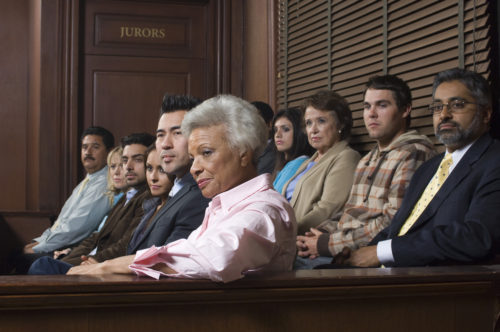Jury Duty – What You Can Expect When You Are Called

Law protects employees from being punished or fired by employers for taking leave of work to serve jury duty. Employers are also restricted from trying to discourage or intimidate employees from serving on a jury. They are allowed to require proof from employees that there was called in for jury duty before they are allowed time off work.
Jury Selection Process
Whether or not the juror knows any of the defendants, witnesses, victims, experts or investigators in the case or if you happen to have any particular knowledge about the case not publicly known.
After these questions are asked and answered, the jury pool is whittled down. The next step is the judge and attorneys for both sides of the case will decide upon the first twelve jurors who satisfy their requirements.
If necessary, the court may decide it is prudent to select some alternates. These back-ups are treated like jurors and listen to all the evidence presented in the case. They do not participate in the actual deliberations unless something prevents one of the original jurors from completing their duty.
Once the jurors are selected, the judge will explain what is expected of them. The judge will probably go over housekeeping items such as if the juror needs a break during the trial, what they can bring into the jury box, how long they have for lunch and what time they are to report each day.
How Long Are Trials?
Most local trials only last a day. Some jurisdictions have made the determination that if you are placed on a jury during the time you are “on call” you have satisfied your commitment and are released from coming back for a period.
During the actual trial, you’ll sit in a designated box and are expected to listen to all the testimony before forming an opinion. Some jurisdictions allow note taking, put provide you the notebooks and pencils as you are entering and leaving the courtroom and collect them as you leave. Some jurisdictions are concerned that people won’t pay close attention and have disallowed note taking.
Who Gives The Jury’s Decision
A foreperson is either determined by the court or elected by the other jurors. This person is the voice of the entire jury and will be responsible for communicating to the court via the bailiff if they can’t hear the testimony, can’t see the visual evidence, it’s too warm or cool, they need a break, etc.
The foreman is also responsible for passing along any information from the court to the jurors. For example, making sure everyone as signed the attendance form and fill out the necessary paperwork to receive their daily stipend.
Is There Any Downtime?
The jury only hears testimony and attorney comments which the judge deems appropriate to the case at hand. Any other information which the judge feels will be prejudicial to the defendant will be discussed while the jury is outside the courtroom. These periods can be short or long depending upon what is discussed.
This is an opportunity for jurors to talk among themselves about anything not related to the case. This is also a good time for a juror to read the paper or book, balance a checkbook, set up doctor’s appointments, etc.
While jury duty can be inconvenient, it can also be a wonderful educational experience in how the judicial system works.
Photo Credit: Shutterstock/sirtravelot